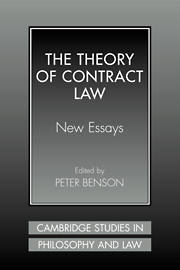Book contents
- Frontmatter
- Contents
- Acknowledgments
- Contributors
- Introduction
- 1 Two Economic Theories of Enforcing Promises
- 2 The Scope and Limits of Legal Paternalism: Altruism and Coercion in Family Financial Arrangements
- 3 Promises and Contracts
- 4 The Unity of Contract Law
- 5 The Theory of Contracts
- 6 Contract Law in the Aristotelian Tradition
- Index
5 - The Theory of Contracts
Published online by Cambridge University Press: 05 October 2009
- Frontmatter
- Contents
- Acknowledgments
- Contributors
- Introduction
- 1 Two Economic Theories of Enforcing Promises
- 2 The Scope and Limits of Legal Paternalism: Altruism and Coercion in Family Financial Arrangements
- 3 Promises and Contracts
- 4 The Unity of Contract Law
- 5 The Theory of Contracts
- 6 Contract Law in the Aristotelian Tradition
- Index
Summary
Introduction
The purpose of this paper is to develop a theory of contracts. The enterprise involved in developing such a theory needs explication, because legal theory has many branches. One branch of legal theory concerns fundamental jurisprudential issues, such as what constitutes law. Another branch concerns institutional issues, such as the nature of adjudication. However, when we talk about the theory of a specific area of law, like contracts, we mean a theory about the substantive content of the rules in that area. In this paper, I will use the terms theory of substantive law and theory of contracts in that sense.
Even with this restriction, there are different conceptions of the tasks that a theory of contracts may perform. For example, the theory of contracts could be a theory of what the content of contract law is, or a theory of what the content of contract law should be. In this paper, I take the position that the primary task that a theory of contracts should perform is to provide a principle for establishing the best content of contract law, that is, a principle for establishing what the content of contract law should be.
Theories of substantive law can themselves be categorized in various ways. For purposes of this paper, I distinguish between metric and generative theories of substantive law. Metric theories identify one or two variables that when properly applied result in determinate legal outcomes (or, under some theories, explain legal outcomes), in a manner somewhat analogous to scientific principles that predict determinate outcomes.
- Type
- Chapter
- Information
- The Theory of Contract LawNew Essays, pp. 206 - 264Publisher: Cambridge University PressPrint publication year: 2001
- 3
- Cited by

